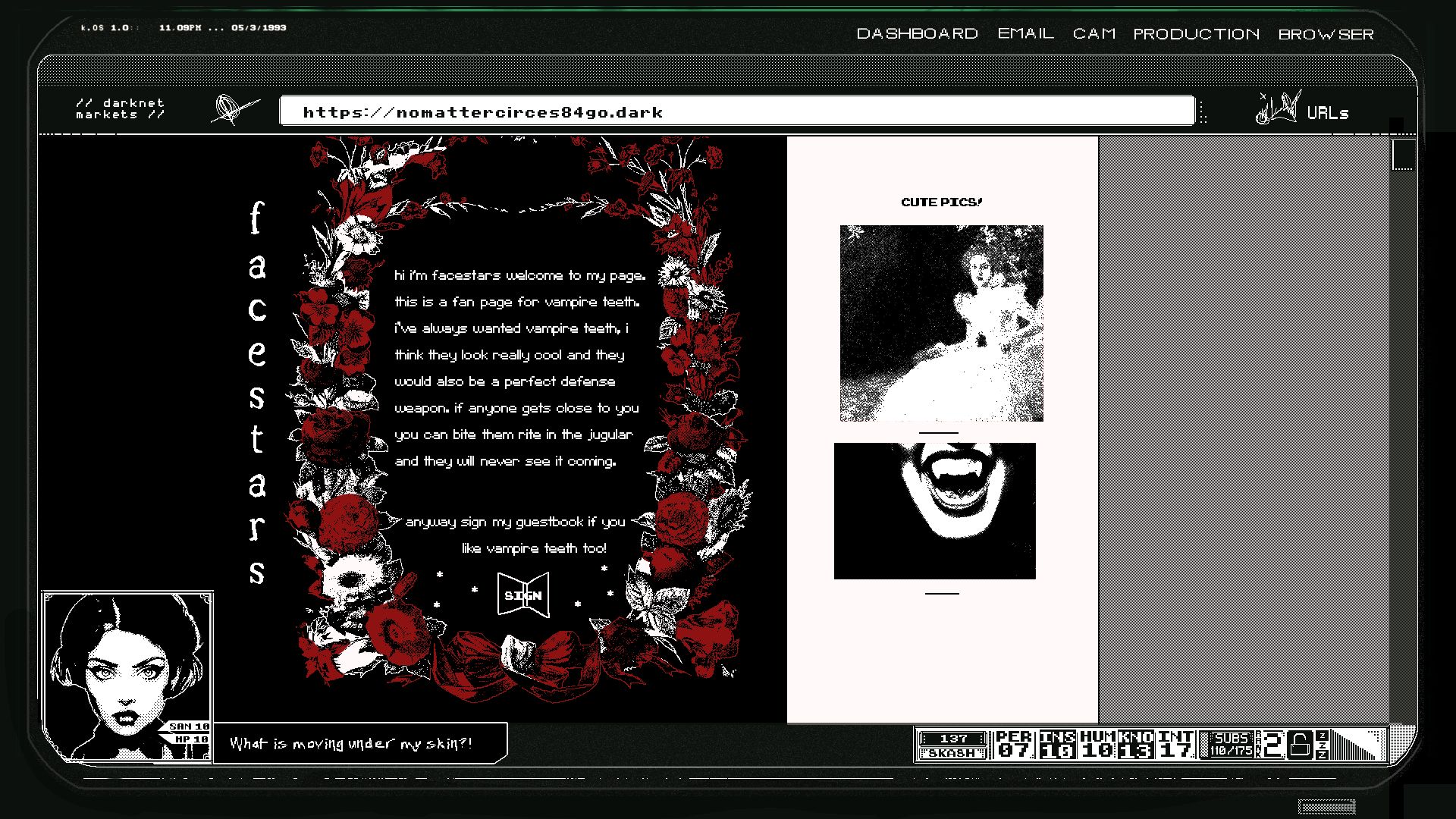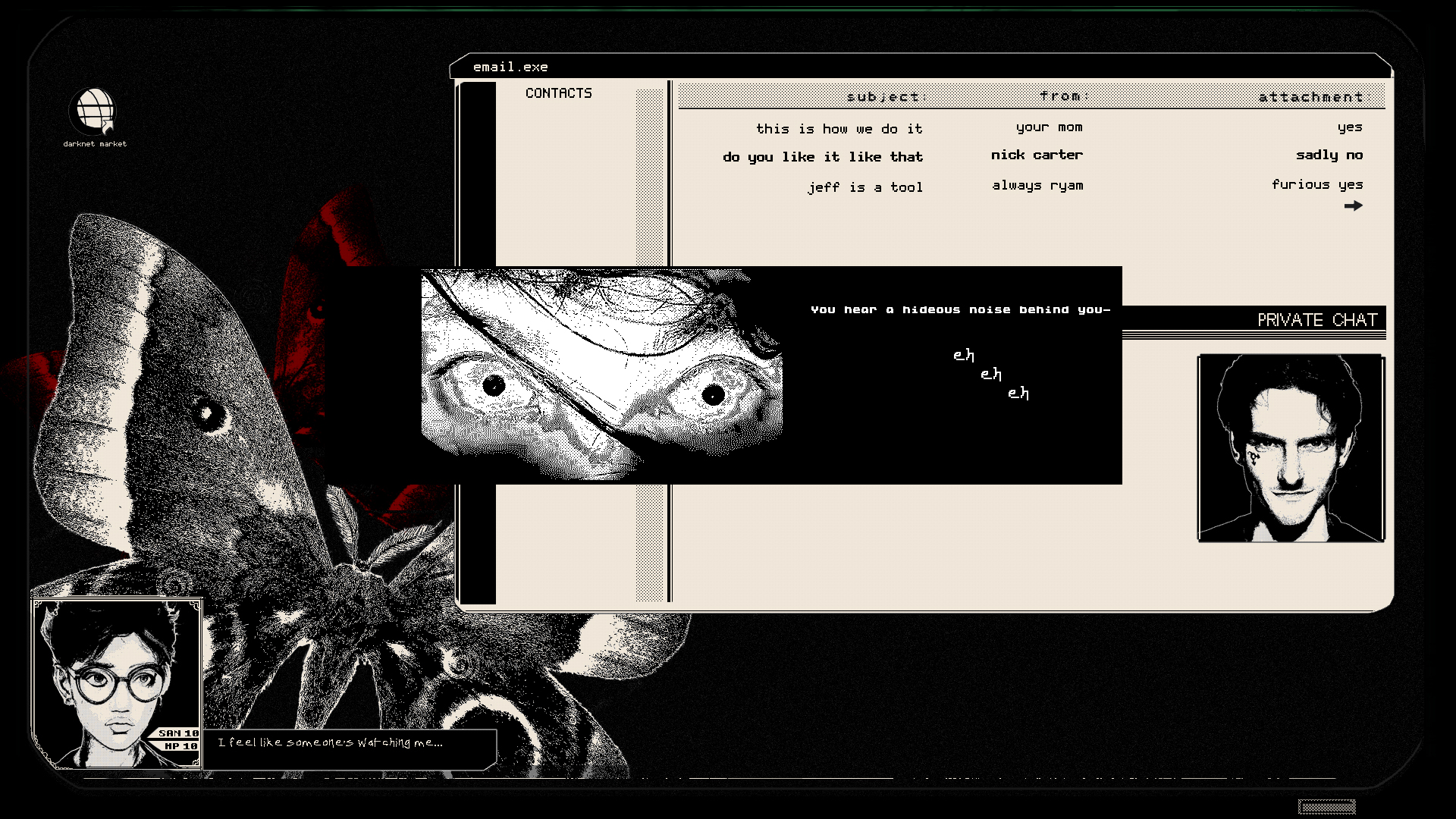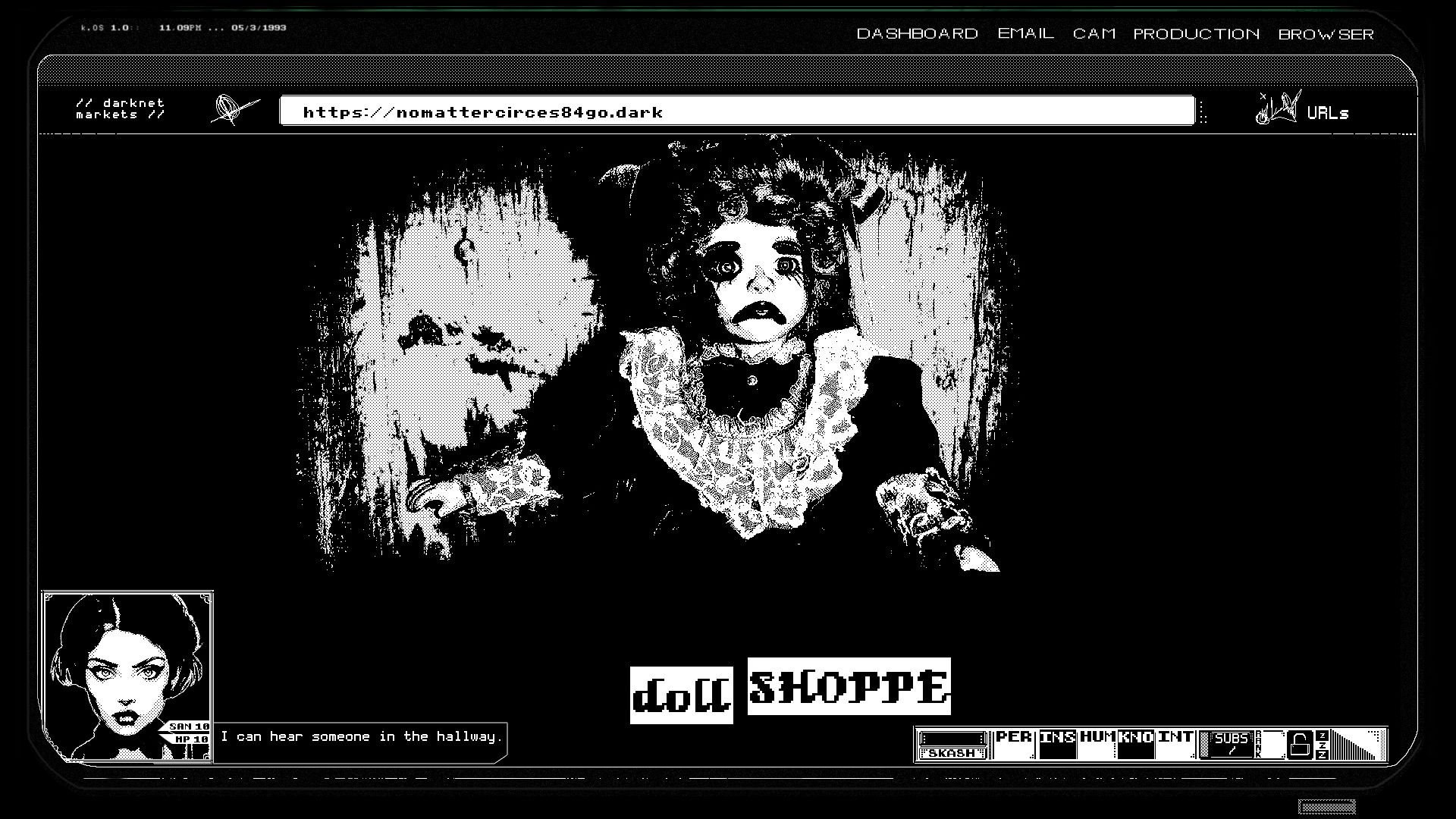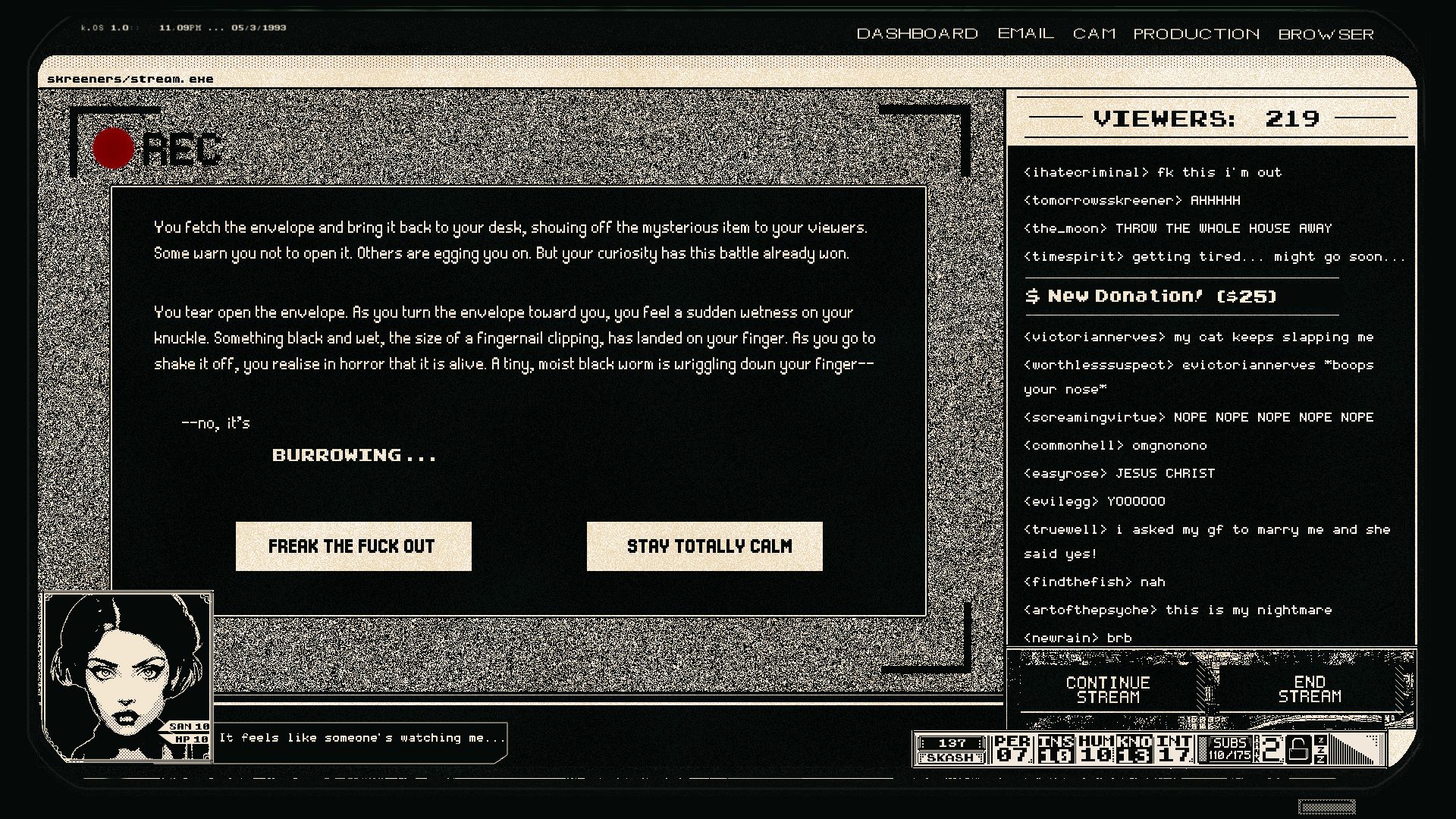Horror game darkwebSTREAMER contains an infinite procedurally generated internet and that sure sounds horrifying to me
The real one is bad enough.
This trailer was produced by Jack Troisi, Danny and Michael Philippou's This is Not a Cult, the directors and company behind the recent box office horror hit Talk To Me, for the PC Gaming Show: Most Wanted.
Trying to make it as a streamer sounds awful. There's the expectation you'll be streaming constantly, and if you miss a single day you'll lose half your subscribers. That you'll be in the mood to chat with viewers whenever they drop by. That you'll sacrifice your private life to encourage parasocial relationships with the people who pay your bills. It's scary before you even get to stalkers and weird things arriving in the mail.
Like a lot of horror, darkwebSTREAMER takes something scary in an ordinary way, then elevates it to a supernatural level. It's a one-bit RPG where you play a wannabe streamer whose unboxing videos aren't of the latest hardware or collectibles, but of cursed containers found on occult websites. You're showing off spooky dolls and boxes full of worms that might try to crawl under your skin. And the only way to get your metrics up is to get more extreme.
Chantal Ryan, designer and co-founder of indie studio We Have Always Lived In The Forest, puts it like this: "Your viewers are not going to be impressed if you're just like, here's a doll! Here's a doll! Here's the same doll every day."
Which pushes you further into the dark web in search of even more cursed objects and rituals. But the dark web of darkwebSTREAMER is all antique websites with guestbooks and rants and conspiracy theories about birds. They're personal homepages and small businesses reminiscent of an earlier era of the internet.
"It doesn't really refer to the dark web of today, the Tor network, etcetera," Ryan says. "I'm quite familiar with those spaces as well, but I think they really pale in comparison to what the early '90s Internet was. That was the true dark web. That was before Google, that was before indexing."
The internet in darkwebSTREAMER is also procedurally generated. An infinite online space of strange people to befriend, occult secrets to uncover, and inadvisable things to buy. "Fundamentally, the game is a roguelite," Ryan says. "It's permadeath, you got one shot to win. Your health and your sanity are constantly lowering and you're constantly trying to keep yourself alive, keep pushing forward. The services you find online will give you access to mechanics that you can use to strategize throughout your playthrough. You might find a witch who can cast spells or rituals that will lessen the amount of damage you receive. Or you might find a demonologist who can perform a banishing ritual that can get rid of some pesky demon who threatens to destroy you. You might find a therapist who can speak to you to raise your sanity for a price, things like this."
Keep up to date with the most important stories and the best deals, as picked by the PC Gamer team.

While all of that can turn up when you explore at random by hitting the "surf the web" button, other things can only be found by taking the more personal approach. The NPCs in darkwebSTREAMER—which We Have Always Lived In The Forest calls NPPs or "non-player persons" as a reminder to treat them like real people—can make websites of their own. These Geocities via MySpace portals are expressions of personality in the way the internet used to be before social media narrowed down to a depressing tunnel we visit to be made angry about things. Ryan, a graphic designer who describes her preferred style as "batshit", was right at home.
"I struggle to choose things so when I design, I'll make many different versions of a thing," she says. "I know that this component could go here, or it could go there, or it could go there. I have to just choose one. Coming to design the web I was like, 'With procedural generation you don't have to choose! The system chooses!' All I need to do is provide the modular components of website-building, give them some kind of relative positions, give them a whole bunch of assets with which to populate and then say, 'Hey, generate our text,' and let the system go to work. We have uniquely generated text that is driven by our NPPs' personalities and speech styles. They might talk about things they love or hate, their enemies, their favorite bands, their conspiracy theories. But it'll also generate visually a completely different web page every single time."
Superhighway of Horror
There are a lot of influences going into darkwebSTREAMER, from found-footage movies to tabletop RPGs. One that will be obvious to those already familiar with it is World of Horror, the similarly one-bit game of investigating mysteries in a haunted Japanese town inspired by the board game Arkham Horror.
"World of Horror has guided the development of the game a lot," Ryan says. "I really love that game, I genuinely think it's a masterpiece. I also have some really big criticisms about the game. That is not an indictment at all on the design, etcetera. It was just when I was sitting there playing with it I was constantly like, 'Wouldn't it be cool if? Wouldn't it be cool if? How good would it be if?' So darkwebSTREAMER leans hardest into those moments where I most felt a need."

World of Horror is effective at communicating an atmospheric sense of absolute uncertainty. Part of that is down to the lo-fi styling. Like budget found-footage movies, horror games can be scarier when they're clearly coming from outside the system. Big-budget horror has to color within the lines of respectability, will only ever shock you in acceptable ways. Indie horror comes unfiltered. It's a rollercoaster you ride in the dark, never knowing when the next drop will be, or how steep.
As effective as World of Horror can be, its randomness sometimes dispels the mood. Recruitable NPCs with the same randomized personality traits stand side by side, events crop up that don't fit their location. I was investigating missing kids on the local school's swim team when a walk down a corridor abruptly led to a shop where masked people were buying up stock in preparation for the apocalypse. Why was this happening in a high school? Because World of Horror's randomized events are drawn from decks of cards, and it doesn't know when you flip a card that doesn't fit.
The way darkwebSTREAMER combats this is with its "narrative thread system", which Ryan summarizes like so: "Basically what we do is we say, hey, you're randomly generating things. Let's actually remember some of these things that you're generating and let's feed them back into the story. Let's allow them to gain a sense of import within the story. Let's allow it to feel like a theme."

Ryan flashes back to high school, and doing a report on a book she hadn't enjoyed. "I remember one of the questions being something like, 'What was the importance of rats in the story? What was the author trying to communicate?' I remember having this weird grappling moment as a writer myself being like, 'Sometimes rats are just rats. It doesn't necessarily have to be big, laden meaning behind everything a writer writes into the story.' But then I had a realization about the things that I had written, where even if you don't intend for something to carry meaning, it's there for a reason, it's representing something for a reason. Rats in a story often represent kind of like dirty conditions or disease, etcetera. It always stuck with me."
While darkwebSTREAMER may be more likely to have ravenous skinworms and midnight stalkers than rats, the principle applies. If something appears once, it's more likely to appear again. "I think about the rats theory when I'm designing," Ryan says. "Even if rats aren't the main topic, if rats keep coming up in the background, rats become this integral part of the story. They become a theme. I'm very big on allowing the player, the experiencer, to come up with their own story and their narrative, I truly believe that's where the magic happens."

That extends to streamers who might play darkwebSTREAMER on-stream, essentially roleplaying themselves. Viewers won't be left out, as darkwebSTREAMER will have Twitch integration that encourages the audience to pretend it's all real. "With that Twitch integration, I want it to feel like everyone is roleplaying this game," Ryan says. "The viewers can actually roleplay in the chat, they can become NPCs in the in-game chat. The streamer can be streaming in the game, and the viewers can be commenting on what's happening. They can make in-jokes, the narrative thread system can pick up things that they're talking about, roll it in. Like the rat system, it can take what the viewers are saying and make that a motif of the game."
Whether you play darkwebSTREAMER as a streamer, as a viewer, or on your own, the idea is that it'll hand you enough interconnected events and characters that you'll find yourself piecing them together into a personal story. One of its other inspirations was RimWorld, which Ryan played as research while developing darkwebSTREAMER. "I was sort of amused, but I wasn't actively super engaged with what was happening," she says of her first RimWorld experience. "But then I was talking to my friend and I started telling him what had just happened in my story. I found myself telling a whole tale, an unbelievable, very engaging tale. In order to explain it to him I had to link these disparate events into a narrative. I found I was incredibly entertained and uplifted and amused in the retelling of that story to him. I enjoyed that experience two times over: I kind of enjoyed it when I played it, but I really, really enjoyed it when I told it, and that was such a pivotal moment in the design."

Jody's first computer was a Commodore 64, so he remembers having to use a code wheel to play Pool of Radiance. A former music journalist who interviewed everyone from Giorgio Moroder to Trent Reznor, Jody also co-hosted Australia's first radio show about videogames, Zed Games. He's written for Rock Paper Shotgun, The Big Issue, GamesRadar, Zam, Glixel, Five Out of Ten Magazine, and Playboy.com, whose cheques with the bunny logo made for fun conversations at the bank. Jody's first article for PC Gamer was about the audio of Alien Isolation, published in 2015, and since then he's written about why Silent Hill belongs on PC, why Recettear: An Item Shop's Tale is the best fantasy shopkeeper tycoon game, and how weird Lost Ark can get. Jody edited PC Gamer Indie from 2017 to 2018, and he eventually lived up to his promise to play every Warhammer videogame.

